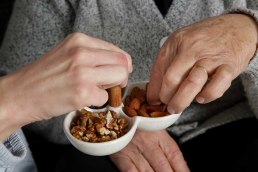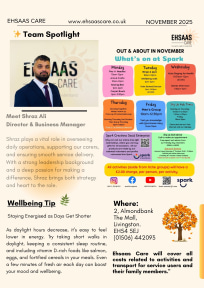Living Well with Diabetes in Later Life


Each year, World Diabetes Day highlights one of the most common long-term conditions affecting older adults. Across the UK, millions live with diabetes, managing it as part of daily life. In this article, we look at what diabetes means in later life and share practical ways to manage diet, medication and routines for better wellbeing.
Understanding Diabetes in Later Life: Why awareness and early checks matter
As we age, the body becomes less efficient at processing sugar. Type 2 diabetes, the most common form in later life, develops when insulin does not work correctly, causing blood sugar levels to rise.
Older adults are more at risk, especially if they are less active, carry extra weight or have a family history of diabetes. The good news is that with early checks and healthy habits, diabetes can be managed successfully.
Your GP can arrange a simple blood test, and the NHS Health Check programme offers free screening for adults aged 40 to 74. If you notice tiredness, thirst or more frequent trips to the loo, speak with your GP or Care Professional. They can often spot small changes that help you act early.
Action tip: Book a free NHS Health Check. Early detection makes treatment easier and supports long-term health.
Eating Well and Managing Diabetes at Home: Simple food choices that make a difference
Balanced eating is key to keeping blood sugar steady. Wholegrains, lean proteins, vegetables and moderate fruit help maintain healthy levels without cutting out entire food groups.
Try to eat regular meals and avoid skipping them, as this can cause dips or spikes in blood sugar. Swapping processed snacks for fruit, oatcakes, or nuts can also help.
At Vitale Care, our Care Professionals can assist with meal planning, shopping and cooking, encouraging small, manageable changes that support overall wellbeing.
Action tip: Plan a week of balanced meals with your Care Professional or family member. Make one healthy swap each day, such as choosing wholemeal bread or fruit instead of biscuits.
Staying Active and Supported: How routines help maintain wellbeing
Gentle movement, such as walking, gardening, or light chair exercises, supports blood sugar control, mobility, and mood. Regular routines also make it easier to remember meals, medication and rest.
Care Professionals can help with reminders, monitoring blood sugar and keeping records to share with healthcare professionals. Action tip: Use a daily checklist for meals, movement, medication and monitoring. It helps build consistency and notice small changes early.
Living Well with Diabetes at Home
Living with diabetes doesn’t have to mean giving up independence or comfort. With practical habits, early checks and a helping hand, many older adults continue to live happily and confidently at home.
If you or a loved one would like to work with a home care provider that understands your needs, contact our friendly team.
Latest Care Provider & Regulatory News
 04-Nov-25
Living Well with Diabetes in Later Life
04-Nov-25
Living Well with Diabetes in Later Life
 04-Nov-25
Pumpkin Carving Contest Champion!
04-Nov-25
Pumpkin Carving Contest Champion!
 04-Nov-25
Pumpkin Carving Contest Winner!
04-Nov-25
Pumpkin Carving Contest Winner!
 04-Nov-25
November Newsletter
04-Nov-25
November Newsletter
 03-Nov-25
Pumpkins!
03-Nov-25
Pumpkins!